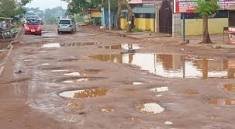Editorial
A call for safer roads: combating accidents in ghana

A state of a deplorable road in ghana
Dear Editor,
Ghana, known for its vibrant culture, rich history, and warm hospitality, is facing a pressing issue that threatens the well-being of its citizens and visitors alike. With a steady rise in accidents across the country, urgent action is needed to address the root causes and implement comprehensive measures to ensure safer roads for all.
Over the past few years, Ghana has witnessed a disturbing trend of increasing accident rates. From bustling urban centres to remote rural areas, the impact of these accidents has been devastating, resulting in a significant loss of lives, injuries, and economic repercussions.
One of the primary contributors to this alarming situation is the lack of road safety awareness and adherence to traffic regulations. Ghana’s roads often witness reckless driving behaviours, including over-speeding, disregard for traffic signals, and poor vehicle maintenance. Such disregard for road safety not only endangers the lives of drivers and passengers but also poses a grave risk to pedestrians and cyclists.
Furthermore, inadequate infrastructure and road maintenance play a significant role in exacerbating the accident rates. Potholes, improper signage, poorly lit roads, and inadequate pedestrian crossings are all contributing factors that need to be addressed urgently. These road conditions not only increase the chances of accidents but also hinder emergency response efforts.
The consequences of these accidents go beyond the immediate loss of lives and injuries. Families are shattered, communities are left mourning, and the economy suffers due to increased healthcare costs and productivity loss. It is crucial to recognise that road safety is not just a transportation issue but a matter of public health and overall societal well-being.
However, amidst this disheartening scenario, Ghana is taking proactive steps to combat the growing menace of accidents. The government, in collaboration with relevant stakeholders, is initiating campaigns to raise awareness about road safety and the importance of responsible driving. Educational programmes targeting schools, communities, and drivers are being launched to promote a culture of safety and responsibility.
Moreover, there is a renewed focus on strengthening traffic enforcement mechanisms. The Ghana Police Service, in collaboration with transport authorities, is cracking down on traffic offenders and implementing stricter penalties for violations. This increased enforcement aims to send a strong message that reckless driving will not be tolerated, and those who endanger lives will face legal consequences.
The government is investing in infrastructure development to enhance road safety. Initiatives are underway to improve road conditions, expand pedestrian-friendly infrastructure, and introduce intelligent transportation systems to manage traffic flow efficiently. These efforts reflect a commitment to ensuring the safety and well-being of all road users.
As citizens, it is our collective responsibility to advocate for change and actively participate in creating safer roads. We must prioritise adherence to traffic regulations, report hazardous road conditions, and support initiatives that promote road safety education and awareness.
DAMOAH ADJOA MONICA (Student of Unimac-Gij)
Editorial
Concern over mentally ill persons roaming Kwame Nkrumah Circle Interchange
Dear Sir
I write to express my concern over the growing number of mentally ill individuals roaming the Kwame Nkrumah Circle Interchange in Accra.
This area, a vital transportation hub and commercial centre, has increasingly become home to several persons visibly suffering from mental health issues, often without adequate care or supervision.
This situation poses risks both to the affected individuals and the general public. Some of these individuals are exposed to traffic hazards, unsanitary conditions, and in some cases, hostile treatment from passersby.
There have also been reports of occasional erratic behaviour, which causes fear and discomfort among commuters and vendors.
Mental health is a public health issue, and these individuals deserve compassion, medical attention, and a safe environment.
I urge the Ministry of Health, the Accra Metropolitan Assembly, and relevant NGOs to collaborate on a sustainable solution including mental health outreach programmes, rehabilitation, and safe housing.
Kwame Nkrumah Circle should be a symbol of progress, not a place where the vulnerable are left to struggle. Let us act with urgency and humanity.
From John Boateng
Kwame Nkrumah Circle
Editorial
Parents should encourage their wards writing BECE
Dear Editor,
AS the 2025 Basic Education Certificate Examination (BECE) takes off across the country starting Wednesday, I write to encourage all candidates taking part in this important step in their academic journey.
Out of a total of 603,328 candidates taking the examination this year, 306,078 are females, whiles the rest 297,250 are males.
Over the years, the examination begins on Monday and ended on Friday but per the timetable, this year’s candidates started on Wednesday and will end next week.
The BECE is not just an exam, it is a milestone from one stage to another. It represents years of hardwork, dedication and the dreams of countless students who hope to continue their education and build a brighter future.
This is where the role of parents, teachers and society become beneficial. Let us offer not only academic support but emotional encouragement to them.
I also appeal to educational authorities to ensure fairness, proper supervision and transparency throughout the examination period.
The journey may be challenging, but with time, focus and discipline they can make it.
I wish to use this platform to wish all of them well.
Naa Koshie, Teshie






